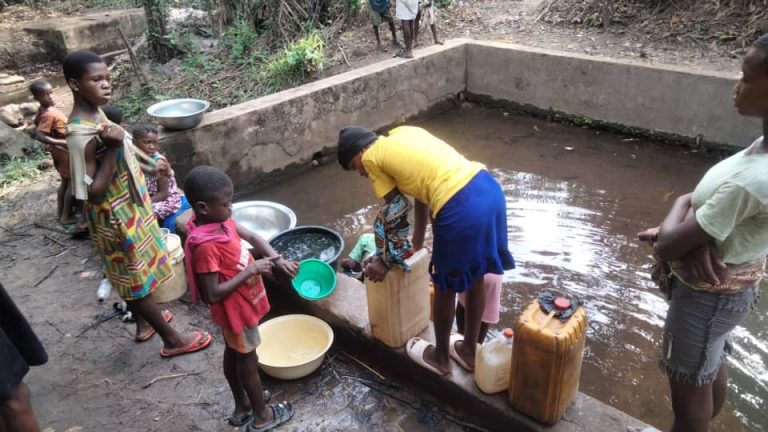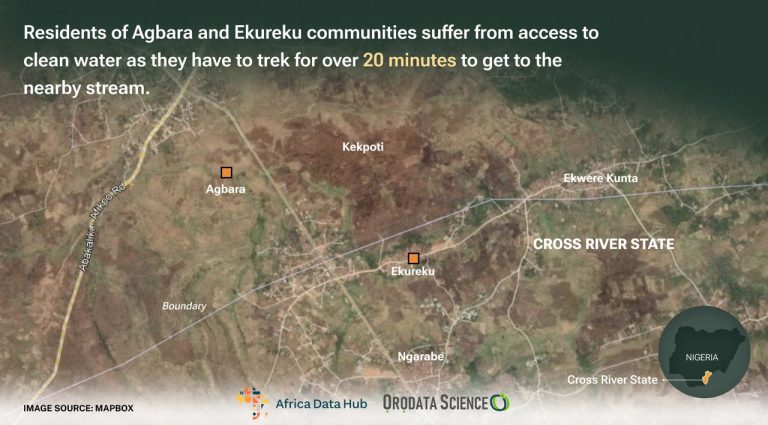By Violet Ikong, TheInvestigator
As bad as the water situation in Agbara and Ekureku is, it has yet to get the government’s attention, and community members get attacked or threatened for publicly calling out the government to address the issue.
Helen Echeng leaves her house every morning before 6 am in search of water for her household. She walks for about 15 minutes through a narrow and lonely path with tall grasses and trees on both sides to get to her water source, a stream located in a forest in her village, Agbara, in Abi LGA Cross River State.
“I have to come here (the stream) very early, especially if I intend to drink and cook with the water because, from late morning, the water becomes cloudy with floating particles as a result of too many people fetching from it,” Echeng said, using a small bowl to fetch water and empty into her gallon.
After filling her gallon, she lifts it to her head and walks back home. The journey back home takes about 20 minutes because the weight of her gallon slows down her movement and aches her legs. “Some days I visit the stream at least five times, and other days, at least 10, depending on the quantity of water my family needs each day,” she said.
This daily struggle for water is an unpleasant experience for Echeng, but she has to go through it all the same because villagers in Agbara depend heavily on streams to access water for domestic use. With a population of over 5000 people, the village has only one manual borehole to supply water to residents. Beyond being insufficient to serve the large population, the borehole is not proximal to residents.
“The location of the borehole is too far for some villagers, and for such people, going to streams is a better option. Also, one borehole cannot effectively solve the water needs of over 5000 people,” said Idaka Sunday, a resident of the community.
Besides the proximal problem with the manual borehole built over 10 years ago, the water is unclean for drinking and bathing, according to villagers. “When we take our bath with water from the borehole, it leaves whitish substances on our body as though the water was mixed with chalk. The water also tampers with the taste of food when used to cook, and it has an unpleasant taste that makes it unfit for drinking,” Echeng said.
For these reasons, most villagers prefer to use water from streams. The responsibility of getting water from the streams primarily lies with women and girls in the village. Although water insecurity is a global problem affecting over 1.1 billion people, rural women and girls suffer the impact more as they bear the brunt of walking long distances to get water from streams for their households.
According to the Global Water Crisis, women and girls spend an estimated 200 million hours carrying water daily, walking 6 kilometers daily to haul 40 pounds of water. As women and girls embark on long journeys to get water, they are exposed to heightened risks of gender-based violence and ill health, a report by United Nations Water explains.
“I’m a farmer and also a trader. There are times I close late from my shop and still have to go to the stream alone to get water. I feel relaxed when I meet other women on my way there or when I get to the stream and see them also fetching water. But when it’s just me, I get scared, knowing anything could happen to me,” Echeng said.
‘The Water Makes Us Sick.’
Besides the long distances that villagers in Agbara have to walk to get to the streams, the water poses health risks to them as it is unfit for consumption. According to Precious Eze, a certified Nigerian health practitioner, “Drinking water from streams isn’t ideal and is unsafe. The fact that the water might even look clean and clear on the surface level doesn’t mean it’s pure for consumption because many human and natural activities go on in the streams.”
Four streams in the village were visited for this story, and none of them appeared to be clean enough for drinking. All streams were surrounded by grasses and shrubs and had colored and muddy water, with different plant growth and particles in them. At one of the streams, children were seen playing in the water while filling their containers with water. Yet, villagers still drink from the streams.
“There is no good drinking water for us as a community. The stream water isn’t good for consumption, but we still drink and cook with it because we are people without a choice,” Echeng said. “And unlike the borehole, water from the streams does not leave whitish substances on our bodies, and we don’t get funny tastes from drinking it,” she added.
Like Agbara, several other villages that make up the Ekureku community, of which Agbara is a part, also suffer from water insecurity. In 2022, Agbara and other villages in Ekureku suffered a cholera outbreak caused by contaminated water from the streams, and over 50 lives were lost.
“Many community members suffered from cholera attacks in 2022, but unfortunately, not all of them survived. Despite that incident, we still rely heavily on streams for water that goes into our bodies,” Echeng said.
According to the United Nations, poor water, sanitation, and hygiene cause 1.4 million deaths annually and shorten the lives of 74 million people. Between January and August 2023, Nigeria recorded 3000 cholera cases, with Zamfara State recording the highest number of cases at 787, followed by Cross River at 718 and Katsina at 302 cases. Bayelsa State recorded 265 cases, while Ebonyi and Niger recorded 227 and 136 cases, respectively.
Besides cholera, villagers in Agbara and Ekureku generally also suffer from typhoid and diarrhea caused by water from the streams. “The water makes us sick, and we spend a lot of money trying to get treatment for typhoid and diarrhea whenever we suffer attacks. It affects our income because we are mostly poor farmers in this community,” Echeng said.
Government Neglect
As bad as the water situation in Agbara and Ekureku is, it has yet to get the attention of the government, and community members get attacked or threatened for publicly calling out the government to address the issue. “People are now too scared to talk about the water situation for fear of the unknown. Once you raise an issue like this (water scarcity) that affects politicians in the community, you could get into trouble,” Idaka said.
The Cross River State government under the leadership of its former governor, Ben Ayade, was accused in 2022 of diverting funds meant for water projects in the state including villages in Ekureku, where Agbara is located. An investigation revealed that the state received 16 billion naira in 2014 from the World Bank to provide water to communities in the state but the government failed to utilize the funds for that purpose.
Over 9 years after the money was received by the State, many villages in the State, Agbara inclusive, still suffer from water scarcity and rely on unclean sources such as streams and hand-dug wells for their water.
While these water problems persist, some residents of Agbara and Ekureku generally, have given up on possible government intervention. “The government should provide water for us because it is not beyond their powers. Nobody enjoys walking long distances to get water from streams. We are suffering even though we do not talk about it for fear of being attacked,” Echeng said.
This story was produced for the Frontline Investigative Program and supported by the Africa Data Hub and Orodata Science. It was supported by the Africa Data Hub – Frontline Investigative Program.
Since You Are Here, Support Good JournalismCrossRiverWatch was founded on the ideals of deploying tech tools to report in an ethical manner, news, views and analysis with a narrative that ensures transparency in governance, a good society and an accountable democracy. Everyone appreciates good journalism but it costs a lot of money. Nonetheless, it cannot be sacrificed on the altar of news commercialization. Consider making a modest contribution to support CrossRiverWatch's journalism of credibility and integrity in order to ensure that all have continuous free access to our noble endeavor. CLICK HERE |
New Feature: Don't miss any of our news again.Get all our articles in your facebook chat box.Click the Facebook Messenger Icon below to subscribe now
Text Advert by CRWatch :Place Yours

Will You To Learn How To Make Millions Of Naira Making Special Creams From Your Kitchen?.Click Here
Expose Your Business And Make More Sales. Advertise On CrossRiverWatch.com Today






Leave feedback about this